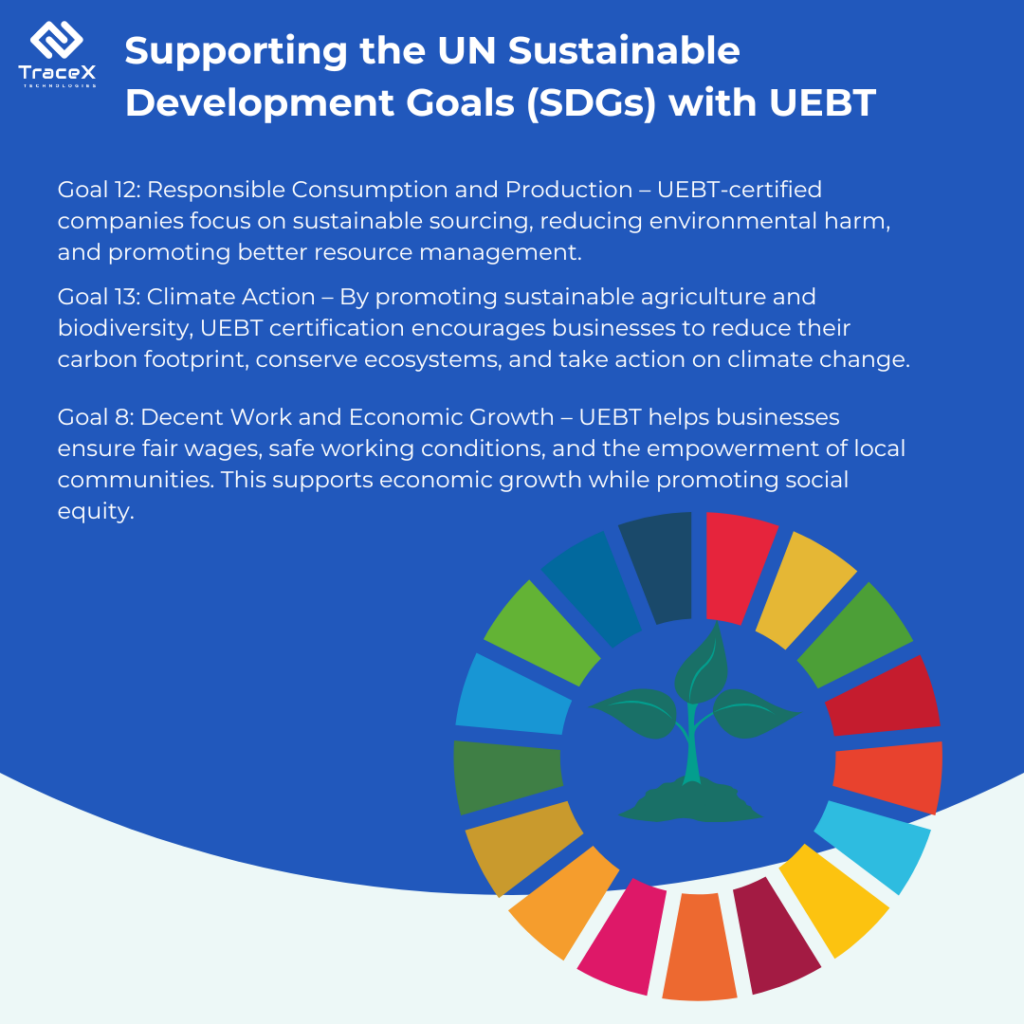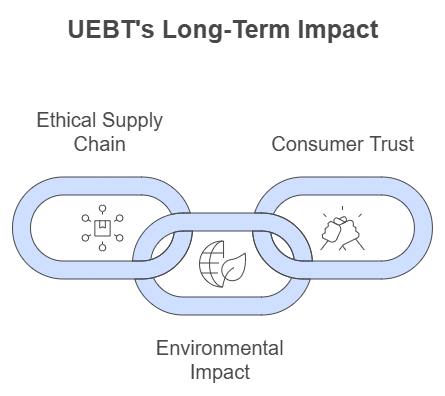Contact: +91 99725 24322 |
Menu
Menu
Quick summary: Discover the importance of UEBT certification in sustainable sourcing, promoting ethical practices, biodiversity conservation, and social responsibility for businesses committed to a sustainable future.

Consumer-driven market is driving businesses to demonstrate their commitment to sustainability, ethics, and environmental responsibility. As demand for transparency in supply chains grows, UEBT (Union for Ethical BioTrade) certification is becoming a key differentiator for brands aiming to lead in responsible sourcing. But how do businesses ensure that their sourcing practices truly reflect these values?
81% of consumers exhibit greater confidence in companies whose dedication to ethically sourcing biodiversity is authenticated by independent organizations.
Many companies struggle with ensuring that their supply chains are ethical and sustainable, often relying on traditional certifications that fail to address the full scope of environmental and social impacts. Without a clear framework for ethical sourcing, businesses risk damage to their brand reputation, losing the trust of consumers and facing potential legal and operational challenges in the future.
Key Takeaways
UEBT certification, or Union for Ethical BioTrade certification, is a mark that shows a company is committed to sourcing natural ingredients ethically and sustainably. It’s all about ensuring that the materials used in products, like cosmetics, food, and pharmaceuticals, are harvested in a way that supports both the environment and the people involved in sourcing them.
1. Ethical Sourcing
At the heart of UEBT certification is the idea of ethical sourcing. This means that companies ensure the ingredients they use are obtained responsibly. This includes paying fair wages to workers, respecting indigenous rights, and ensuring that sourcing doesn’t harm the environment or local communities. Companies with this certification demonstrate they’re actively working to improve the livelihoods of everyone involved in their supply chains.
2. Biodiversity Preservation
Biodiversity is crucial for maintaining healthy ecosystems, and UEBT-certified companies commit to protecting biodiversity. This involves sourcing raw materials in ways that don’t deplete natural resources or harm wildlife habitats. It encourages companies to use ingredients that are grown sustainably and to respect nature’s balance, ensuring that the planet’s ecosystems remain healthy for future generations.
3. Social Responsibility:
Beyond environmental concerns, UEBT certification places a strong emphasis on social responsibility. This means ensuring the fair treatment of workers, especially those in developing regions where exploitation or unsafe working conditions may be common. Companies must provide safe working environments, fair wages, and empower local communities to thrive. Social responsibility also extends to building strong relationships with indigenous communities and respecting their knowledge and practices.
To earn UEBT certification, companies must meet a set of rigorous standards and guidelines that cover all aspects of ethical sourcing. Here are some of the key requirements:
In short, UEBT certification is a powerful tool that helps companies prove their dedication to ethical sourcing, biodiversity conservation, and social responsibility. It’s not just about meeting a set of standards—it’s about making a real difference in how ingredients are sourced and how people and the planet are treated. Getting certified isn’t easy, but for businesses that are serious about sustainability, it’s a worthwhile investment that demonstrates their commitment to a better future.
When businesses don’t prioritize ethical sourcing or fail to get certified by organizations like UEBT, they open themselves up to several risks that can have long-lasting impacts on their reputation, operations, and bottom line.
One of the most significant risks of unsustainable sourcing is the damage it can cause to the environment. When companies source materials without considering their impact, it can lead to deforestation, loss of natural habitats, and depletion of resources like water and soil. This isn’t just bad for the environment—it can also affect the future supply of those materials. For example, unsustainable palm oil production has been a major driver of deforestation in places like Southeast Asia, where forests are cleared to make way for plantations. This loss of forest areas contributes to biodiversity loss, threatening species and ecosystems that are crucial for maintaining environmental balance.
The long-term impact of this? It’s a vicious cycle. If we keep depleting natural resources and causing harm to ecosystems, it can lead to shortages, disruptions, and ultimately a less sustainable supply chain for businesses that rely on these materials.
Unsustainable sourcing often comes at the expense of vulnerable communities, where unfair labor practices can thrive. When companies don’t ensure that workers are treated ethically or paid fair wages, they risk perpetuating exploitation. Many products come from regions where workers, often in developing countries, face poor working conditions—unsafe environments, low wages, and lack of basic rights.
For example, in some parts of the world, workers on cocoa farms face extremely poor conditions, with child labor being a significant issue. If a company sources cocoa from these farms without ensuring fair labor practices, they become complicit in this injustice. The downside is twofold: not only is the company contributing to social harm, but it also faces reputational risks. Consumers are increasingly aware of these issues and are demanding greater transparency from the brands they support.
Today’s consumers are more conscious than ever about the products they purchase. They want to know where their products come from, who made them, and what impact the production has on the environment and communities. Brands that fail to meet these expectations risk losing consumer trust and business.
Ethical sourcing is no longer a “nice to have”—it’s a “must-have.” Consumers, especially younger generations, are willing to pay more for products that align with their values. A lack of certification can signal to customers that a brand isn’t doing enough to meet these growing demands for sustainability and social responsibility.
UEBT certification is a powerful tool for businesses that want to prove their commitment to ethical sourcing, biodiversity, and social responsibility. It’s not just a badge of honor—it brings real benefits to the environment, communities, and the economy. Let’s take a closer look at why UEBT certification matters for businesses.
One of the biggest environmental benefits of UEBT certification is that it helps protect biodiversity. When companies are certified, they commit to sourcing natural ingredients in ways that don’t harm ecosystems. This means avoiding practices that contribute to deforestation, habitat loss, or the destruction of wildlife populations. By respecting biodiversity, companies help ensure that ecosystems remain healthy and balanced, providing a stable environment for future generations.
For example, UEBT-certified companies in the beauty or food industries might source their ingredients from places that are rich in biodiversity, like tropical rainforests. These companies ensure that their sourcing practices do not lead to the destruction of these precious ecosystems. So, not only are they using quality, sustainable ingredients, but they are also playing a key role in protecting the planet.
UEBT certification pushes businesses to support sustainable agriculture. This means that crops are grown in a way that doesn’t deplete the soil, waste water, or harm the surrounding environment. Sustainable farming practices promote healthier land, better water management, and overall resource conservation.
Think of it this way: certified companies support farmers who are using natural methods to grow crops without over-relying on harmful chemicals or depleting the land’s resources. This is crucial for making sure that agriculture can continue to provide for people without exhausting the Earth’s natural resources.
UEBT certification is all about ensuring that workers are treated fairly. This means paying fair wages and making sure working conditions are safe. In many parts of the world, workers on farms or in factories may be exploited or forced to work in unsafe conditions. UEBT-certified companies make sure this doesn’t happen.
By following UEBT standards, businesses guarantee that the people who grow and harvest the materials used in their products are paid fairly, work in safe environments, and are treated with dignity. This not only helps protect workers’ rights but also ensures that they can earn a living wage and support their families in a sustainable way.
UEBT certification also focuses on empowering communities. This goes beyond fair wages—it’s about creating lasting positive impacts. When companies source from local communities, they don’t just buy ingredients—they invest in the future of those communities. This could mean funding education, building infrastructure, or helping farmers improve their agricultural practices.
Empowering local communities helps create better opportunities, lifts people out of poverty, and provides a path toward long-term sustainability. It’s a win-win: businesses can count on reliable, high-quality sources for their materials, and the communities thrive.
Today’s consumers are more conscious than ever about the products they buy. They want to support brands that align with their values—especially when it comes to sustainability. UEBT certification helps boost a company’s reputation because it shows that they are doing their part to protect the environment and support fair labor practices.
This certification provides consumers with the confidence that they’re purchasing from a brand that is ethical and responsible. As more people become aware of environmental and social issues, they are more likely to support companies that actively work to address these concerns. For businesses, this can lead to increased loyalty, repeat customers, and positive word-of-mouth.
UEBT certification can open the door to new markets and partnerships. As more retailers, brands, and consumers prioritize sustainability, having UEBT certification becomes a competitive advantage. Many companies—especially those in the beauty, food, and pharmaceutical industries—are looking for suppliers and partners who share their commitment to sustainability. By getting certified, businesses can attract new customers and build strong partnerships with other brands that care about social and environmental responsibility.
Additionally, many markets around the world are increasingly demanding higher standards of sustainability. Whether it’s new regulations or consumer preferences, having UEBT certification can give businesses the edge in tapping into these markets and expanding their reach.

One of the primary hurdles businesses face when pursuing UEBT certification is the upfront investment required to transition to sustainable sourcing practices. Sustainable sourcing involves paying fair wages to workers, using environmentally-friendly farming methods, and ensuring that the ingredients used are produced without harming ecosystems. For many companies, this transition can be costly, especially if they are shifting from traditional sourcing practices to ones that focus on sustainability.
TraceX’s sustainability platform simplifies the process of adopting sustainable sourcing practices by offering transparency across the entire supply chain. The platform provides tools that help businesses track and manage the sustainability of their supply chain—from farm to final product. With traceability features, companies can ensure that every ingredient sourced aligns with ethical standards. This removes the guesswork and complexity of ensuring sustainable sourcing, allowing businesses to confidently invest in the right practices without fear of non-compliance or inefficiency.

The complexity of modern supply chains can be a major barrier to achieving UEBT certification. Many companies source ingredients from multiple suppliers across various regions, making it difficult to ensure that every step in the supply chain adheres to UEBT’s sustainability and ethical standards. Achieving full traceability—the ability to track a product’s journey from origin to final consumer—can be daunting and resource-intensive, especially when working with multiple tiers of suppliers.
This is where TraceX’s platform comes into play. TraceX provides end-to-end traceability by using cutting-edge technologies like blockchain and satellite monitoring to record every transaction, from farm to consumer. The platform enables businesses to track products with real-time data on sourcing practices, production methods, and even the social impact on the communities involved.
TraceX simplifies the process by offering easy-to-use tools that connect companies with their suppliers, giving them the ability to verify sustainability and ethical practices at every level. This helps businesses meet UEBT certification requirements while gaining confidence that their entire supply chain is operating in an ethical and sustainable way.
Another challenge businesses may face when pursuing UEBT certification is internal resistance to change. Shifting towards sustainable and ethical sourcing practices may face opposition from stakeholders within the company—whether due to perceived costs, unfamiliarity with new processes, or simply the inertia of doing things the traditional way. This can slow down the transition process and make achieving certification more difficult.
TraceX’s platform makes the transition easier by offering user-friendly tools and data-driven insights that help businesses demonstrate the value of sustainability to internal stakeholders. The platform’s real-time dashboards and customizable reports allow businesses to track their progress toward sustainability goals and present the results in a clear and compelling way. This transparency can help stakeholders see the benefits of UEBT certification and gain buy-in for the necessary changes.
Another obstacle to UEBT certification is the complexity of ensuring compliance across different regions with varying environmental and labor laws. Businesses that source from multiple countries or regions may encounter differing regulatory requirements and local challenges when it comes to labor rights, environmental protection, and biodiversity preservation.
TraceX simplifies the compliance process by offering a centralized platform for monitoring sustainability practices across regions. By using the platform’s multi-tier supply chain tracking capabilities, companies can ensure that they are meeting regional requirements for sustainability and ethical sourcing, while also adhering to UEBT’s global standards. This unified approach helps businesses stay compliant no matter where they operate, reducing the risk of non-compliance and ensuring a seamless path to certification.
The TraceX Sustainability Platform leverages blockchain technology to provide end-to-end traceability and transparency across supply chains. Designed for the agribusiness sector, it empowers companies to track every stage of production, from sourcing to consumer delivery, ensuring authenticity, compliance, and ethical sourcing. The platform offers data-driven insights for sustainability assessments, helps reduce environmental impact, improves supply chain efficiency, and enhances consumer trust by guaranteeing product quality and responsible practices. With TraceX, businesses can promote sustainable farming, meet regulatory standards, and build resilient and transparent value chains.
UEBT certification goes beyond compliance; it represents a commitment to ethical, sustainable, and socially responsible sourcing practices. By aligning with UEBT’s rigorous standards, companies contribute to the conservation of biodiversity, fair treatment of workers, and responsible value chains that consumers can trust. Achieving this certification is an investment in the planet, people, and long-term business success, fostering a more equitable and sustainable future for all stakeholders involved.
UEBT certification demands adherence to strict ethical sourcing standards, including biodiversity conservation, fair labor practices, and traceable, transparent supply chains. Companies must regularly undergo independent audits to maintain their certification.
UEBT certification boosts brand credibility, enhances consumer trust, opens new market opportunities, and ensures compliance with global sustainability standards, ultimately leading to a stronger, more resilient business.
Yes, small businesses can achieve UEBT certification by adopting ethical and sustainable practices throughout their supply chains. UEBT provides guidance and support to help businesses of all sizes meet their standards.
